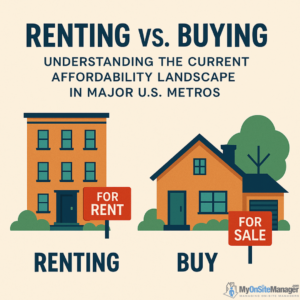For decades, the debate between renting and buying a home has been at the forefront of financial discussions. While homeownership has long been viewed as a key step toward building wealth, recent data suggests that renting is now the more affordable option in all major U.S. metropolitan areas.
A study by LendingTree, which analyzed U.S. Census Bureau data, found that in the country’s 100 largest metros, renters are consistently paying less each month compared to homeowners with a mortgage. This shift raises important questions about financial priorities, housing stability, and long-term investment strategies.
The Cost Difference Between Renting and Buying
National Averages Show a Growing Gap
According to the study, in 2023, the median monthly rent across the U.S. was $1,406, while homeowners with a mortgage had a median monthly cost of $1,904. This translates to a difference of $498 per month in favor of renters. What’s more, the affordability gap between renting and homeownership has been widening—just a year prior, in 2022, the difference was $475 per month.
This trend suggests that as home prices and interest rates continue to climb, the financial burden of homeownership is becoming heavier, making renting a more attractive option for many individuals and families.
Metros with the Largest and Smallest Gaps
While the cost difference between renting and homeownership exists nationwide, some cities have significantly larger gaps than others.
-
Largest Disparities: Cities where homeownership is much more expensive than renting include:
- San Francisco, CA – Median rent: $2,397 | Median homeownership cost: $3,811 | Difference: $1,414
- Bridgeport, CT – Median rent: $1,904 | Median homeownership cost: $3,138 | Difference: $1,234
- New York, NY – Median rent: $2,121 | Median homeownership cost: $3,216 | Difference: $1,095
In these markets, high home prices, property taxes, and maintenance costs contribute to the significant cost burden for homeowners.
-
Smallest Disparities: On the other hand, in some cities, the gap between renting and homeownership is much smaller:
- Phoenix, AZ – Median rent: $1,760 | Median homeownership cost: $1,850 | Difference: $90
- Orlando, FL – Median rent: $1,703 | Median homeownership cost: $1,810 | Difference: $107
- Palm Bay, FL – Median rent: $1,388 | Median homeownership cost: $1,487 | Difference: $99
In these metros, the relatively lower cost of homeownership makes buying a more viable option for those who can afford a down payment and qualify for a mortgage.
Should You Rent or Buy? Key Considerations
While renting is currently the cheaper option in every major metro, financial decisions around housing depend on more than just monthly costs. Here are some key factors to consider when weighing the benefits of renting versus buying.
Benefits of Renting
- Lower Immediate Costs – Renting typically requires a security deposit and first month’s rent, while buying a home involves a substantial down payment, closing costs, and additional fees.
- Flexibility – Renters can move more easily, making it ideal for those uncertain about long-term plans or career changes.
- No Maintenance Responsibilities – Landlords are usually responsible for repairs, maintenance, and property management.
- Predictable Monthly Expenses – With renting, there are no unexpected costs for repairs or property tax increases.
Benefits of Buying
- Building Equity – Unlike rent payments, mortgage payments contribute to home equity, allowing homeowners to build long-term wealth.
- Tax Benefits – Mortgage interest and property taxes can be deductible on federal tax returns, providing financial relief.
- Stability and Control – Homeowners don’t have to worry about landlords increasing rent or selling the property. They can also renovate and modify their homes as they please.
- Potential Appreciation – Over time, home values tend to rise, meaning homeownership could be a profitable investment.
Conclusion
Given the current economic landscape, renting offers a more affordable monthly payment in all major U.S. metro areas. However, while affordability is a crucial factor, choosing between renting and buying is a highly personal decision that depends on lifestyle, financial stability, and long-term goals.
For those seeking short-term flexibility or who are not ready for the financial responsibility of homeownership, renting may be the best option. Conversely, for individuals looking to build wealth and establish housing stability, buying may still be worth considering—especially in metros where the rent vs. buy gap is smaller.
As the housing market continues to evolve, it’s essential for individuals to assess their unique financial situation and consider all aspects before making a decision.
Source:Kaizen Group – Renting is Less Expensive Than Homeownership in Every Major US Metro

